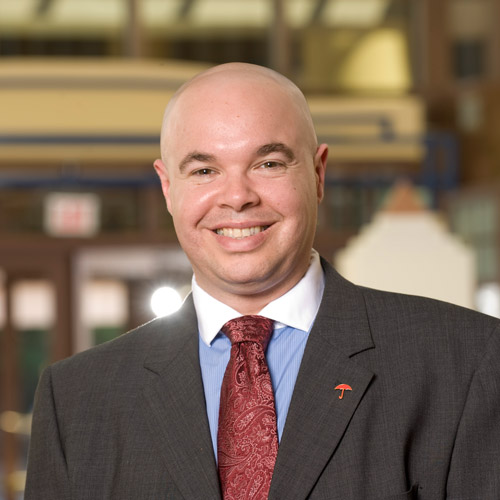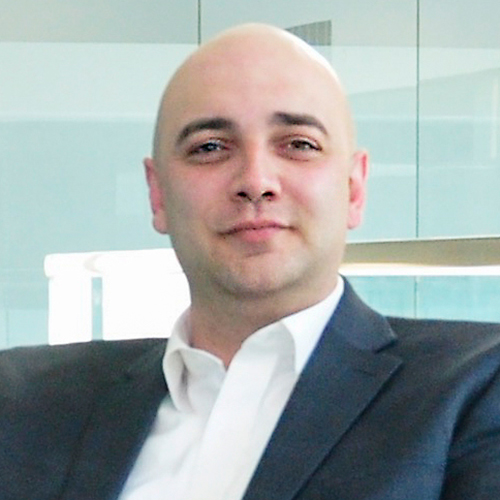Basketball was invented at the YMCA. So was volleyball and weightlifting for sport. Since the YMCA was founded in London 170 years ago, it has served as an open space for community members to gather at times of political and societal unrest. The Y has a long history of providing a safe and positive place to all.
Today, the mission and message are still the same, but the message is marketed differently. The YMCA’s senior legal counsel for marketing and intellectual property, Luis Lozada, says the marketing strategy has become even more rooted in strengthening communities though healthy living, youth development, and social responsibility. “At its core, the YMCA is a place where you can be yourself,” says Lozada. “When you need something to do—or someone to talk to— you can find that person at the Y.”
Historically, local Ys in the United States have been an amalgam of logos and messages. But within the last six years, the YMCA of America (Y-USA) team has intentionally shifted to a unified voice and mission.
It’s a significant brand transition to a single voice, a single logo, and the same dedication to improving communities. “[Kids’] attention spans are a lot shorter now,” says Lozada. In the past, if someone was asked about his or her Y story, they would relay how they grew up at the YMCA and went to summer camp. But today, there’s Twitter, Facebook, Instagram, and texting. The twenty-second elevator pitch is too long, and the YMCA has reacted to how consumers ingest information in order to create a more synthesized message that showcases its broad benefits for the
community.
“For A Better Us” is the organization’s first-ever nationwide multimedia marketing campaign, which includes two types of television commercials designed to resonate differently with viewers: “Places” and “Idle Hands.” “Places” features people in underserved communities who lack the opportunity and resources they need to thrive, and “Idle Hands” explores the need all kids have for a safe and productive place.
The other pillar of the campaign is “Zoe for President.” It’s whimsically styled to run during election season. Zoe is a one-year-old with a desire to run for president in 2064. The series highlights that if she has a good foundation in youth development, healthy living, and social responsibility, she’s well-positioned to lead the country in 2064. It’s a reminder that the Y is a charitable organization that provides services to all—from diabetes prevention programs and veterans’ services, to summer camp and after-school care.
“It does not matter what stripe of the world or the country you come from, there’s something at the YMCA that can benefit you,” Lozada says, and it’s no different for him.
The YMCA is part of Lozada’s DNA. He grew up at the West 63rd Street YMCA in New York. As a child living in a single-parent household in the city, the Y provided Lozada with the opportunity to experience New York in a different light. He remembers throwing his first baseball at Central Park and his first field trip to the Museum of Natural History. The Y was the place he did homework with a tutor while his mom was working. It was also where he learned to swim. “I remember holding on to the side of the pool and kicking my legs,” Lozada recollects from his first swim lesson. “They’re telling me to kick my legs, and my shins hurt because I’m kicking so hard in the pool,” he says, laughing. “It’s those memories that are ingrained in me.”
“It does not matter what stripe of the world or country you come from; there’s something at the YMCA that can benefit you.”
He remembers going to the Y summer program and thinking his counselor was the coolest person in the world. The Y provided Lozada with mentors and experiences that positively shaped the direction of his adolescence.
Lozada now draws upon his memories to foster new ones in the next generation. Last summer, he used his relationships with local Ys to help a couple of kids he knew through family. He wanted them to go to summer camp, so he called and offered to pay for the kids to attend.
Two weeks after camp started, Lozada was in the neighborhood barbershop when the children came by, dying to give a report on their experience. One of the boys didn’t normally have planned activities during his summer days. “But here he is, reciting every activity he did from Monday through Friday and the names of his counselors, telling me it’s the best summer he’s ever had.”
In the nineteen months that Lozada has been with the YMCA, he’s utilized his background in intellectual property and working with big-name brands to refresh the thinking about the brand and to keep the YMCA in the conversation. “The YMCA has always been a place where people have come together to think and engage the community,” Lozada says. He structured YMCA’s new marketing strategy by drawing on his experience with brands out in the marketplace in competitive spaces. He worked previously as a trademark and copyright attorney at Kelley Drye in New York City.
For the YMCA, Lozada wanted to make the strategy more aggressive and push some boundaries, even though the YMCA movement in the United States has, traditionally, been conservative.
“Essentially, we are a very conservative organization in taking risk,” Lozada says. “The YMCA is very good at getting things accomplished, but we’re not very good about adverting the milestones and great things that we’ve been so instrumental in creating.”
With a new strategy that includes television spots and online campaigns, Lozada is changing the way the YMCA is getting its message out there with one logo, one voice, one unified message.
“The YMCA used to help me,” Lozada says. “Now, I can help the Y. It’s a gratifying feeling.”
YMCA a Través de los Años
1844
George Williams opens the first Young Men’s Christian Association (YMCA) in London
1851
Thomas Sullivan and six colleagues found the first YMCA in the United States at the Old South Church in Boston
1853
Freed slave Anthony Bowen starts the first African-American YMCA in Washington, DC
1890s
Physical education teacher James Naismith invents basketball at the International YMCA Training School in Springfield, Massachusetts
1917
The YMCA provides welfare services for the military throughout WWI
1992
YMCA conducts the first national Healthy Kids Day, emphasizing the importance of keeping children happy and healthy while improving their developmental skills
2001
1,200 YMCA facilities host the World’s Largest Run event in the country’s first synchronized run/walk across all US time zones. The event celebrates the 150th anniversary of US YMCAs while highlighting the importance of physical activity for children and parents
2008
The Armed Services YMCA and Y-USA partner with the US Department of Defense in the Military Outreach Initiative, which funds memberships and child care for families facing the hardship of military deployment
2010
The YMCA revitalizes its brand, referring to itself as the Y for the first time, positioning it as an important partner in chronic disease prevention. First Lady Michelle Obama chooses the Y to launch the pillars of her “Let’s Move” campaign, aimed to stomp out childhood obesity
2011
All Ys adopt a set of healthy eating and physical activity standards in all of before- and after-school programming
2014
The Y launches its signature social responsibility program, called Togetherhood, and launches its first national fundraising strategy to raise awareness of the Y as a cause-driven organization
2015
Kevin Washington takes over as the 14th president and CEO of the YMCA of the United States, becoming the first African-American to hold the position

